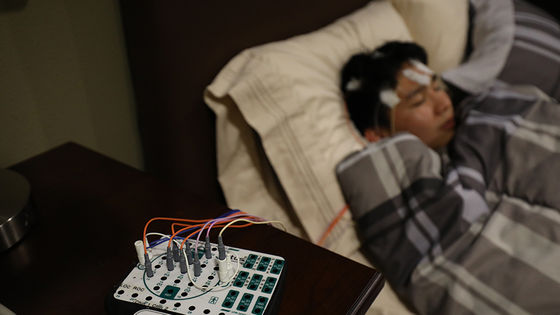'Songs that repeat endlessly in my head' turned out to interfere with sleep

A new study of listening habits and sleep has revealed that 'songs that are repeated endlessly in your head' have a negative effect on your sleep. The authors of the study advise to change the habit of listening to music before bedtime.
Bedtime Music, Involuntary Musical Imagery, and Sleep --Michael K. Scullin, Chenlu Gao, Paul Fillmore, 2021
Music Listening Near Bedtime Disruptive to Sleep, Baylor Study Finds | Media and Public Relations | Baylor University
https://www.baylor.edu/mediacommunications/news.php?action=story&story=223743
Earworms Don't Just Haunt You When You're Awake, Sleep Study Reveals
https://www.sciencealert.com/here-s-how-listening-to-music-before-bed-can-seriously-disrupt-your-sleep
The phenomenon that 'the same song is repeated endlessly in my head' is called ' Earworm' in English because of the imagination that insects stuck in the ears keep making sounds. I will. The research on the effects of such earworms on sleep was conducted by a research team led by Associate Professor Michael Skarin, who studies sleep at the Faculty of Psychology at Baylor University in the United States. Associate Professor Skarin and colleagues asked 50 subjects to actually sleep at the University's Institute of Sleep Neuroscience and Cognition to investigate how earworms affect sleep quality.

In this study, Taylor Swift's 'Shake It Off, ' Carly Rae Jepsen's ' Call Me Maybe, ' and Journey's ' Don't Stop Believin' ' are catchy, popular, and earworm-inducing songs. Adopted 3 songs. The original version and instrumental version of these three songs were assigned to each subject, and interviews were conducted on 'whether or not an earworm occurred' and 'the situation when it occurred'.
Taylor Swift --Shake It Off --YouTube
Comparing the results of this interview survey with the sleep status, it was found that the subjects who became earworms not only had trouble falling asleep, but also increased the frequency of awakening and the rate of light sleep. In addition, a quantitative analysis of sleep brain waves by the research team found that subjects who reported that they 'woke up because of earworms while sleeping' had memory reactivation in the primary auditory cortex of the brain. It was confirmed that slow-wave vibrations showing signs were induced.
In addition to the above experiments, an interview survey was also conducted with 199 subjects. In this study, subjects who said they experienced earworms at night more than once a week were six times more likely to have poor sleep quality than subjects who rarely experienced earworms.
As a noteworthy point in the series of results, Associate Professor Skarin pointed out that the instrumental version especially worsens sleep. 'We found that the instrumental version was twice as likely to trigger earworms as the original version,' he said.
Associate Professor Sukarin commented, 'The more music you listen to, the more likely you are to have earworms at bedtime, which increases your chances of getting a bad night's sleep,' recommended by health agencies. Advice to change the habit of 'listening to relaxing music before going to bed'. Instead, he said, his previous studies have shown that 'creating a list of things to do the next day will reduce future anxiety and help you fall asleep faster.'
Related Posts:







